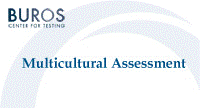Buros-Nebraska Series on Measurement and Testing

Multicultural Assessment in Counseling and Clinical Psychology
Date of this Version
Spring 1996
Document Type
Book Chapter
Citation
Published in Multicultural Assessment in Counseling and Clinical Psychology, edited by Gargi Roysircar Sadowsky and James C. Impara (Lincoln, NE: Buros Institute of Mental Measurements, University of Nebraska–Lincoln, 1996).
Abstract
Ponterotto, Sodowsky, and Pope-Davis are paying attention to the nomological net encompassing multicultural counseling competencies for definitional and utilitarian purposes. The studies· reported in this section suggest that the Multicultural Counseling Awareness Scale (MCAS) and the Multicultural Counseling Inventory (MCI) are relatively reliable, valid, and pragmatic measures. Although the MCAS and MCI assess multicultural competencies, they differ in their item content, and, hence, in their operational definitions of multicultural knowledge, skills, and awareness. They have different numbers of factors. In addition, the item content of their respective factors/subscales indicates that the MCAS focuses on self-reported attitudes and the MCI on self-reported behaviors. Users need to be aware of the distinctiveness of the two measures and not treat them interchangeably. Nonetheless, one characteristic shared by the measures is their usefulness. After a decade's emphasis in counselor preparation for increased multicultural responsiveness and relevant theory-building in training, the MCAS and MCI have made available devices to assess multicultural training outcomes.
Joseph Ponterotto and his collaborators in "Development and Initial Validation of the Multicultural Counseling Awareness Scale" (MCAS) address (a) whether multicultural competence is a definable construct, and (b) whether multicultural growth acquired through training can be assessed. After defining constructs a priori on the basis of preceding landmark papers on multicultural counseling competencies, the authors show that the MCAS has two subscales, Knowledge/Skills and Awareness, with high internal consistency reliabilities for the Knowledge/Skills subscale and the full scale, a moderate alpha for the Awareness subscale, and moderate interscale correlations. The longer Knowledge/Skills subscale consistently discriminates among various criterion groups, such as individuals with a higher level of educational preparation in counseling, national experts, students with supervised minority clinical work, participant race, participant gender, and pretested-posttested students in multicultural counseling classes. However, score differences are not shown consistently and across various groups on the Awareness subscale. This difference in the ability of the two subscales of the MCAS to discriminate among groups may be due to (a) the difficulty in operationalizing and measuring sensitivity to issues of race, ethnicity, and culture; (b) the MCAS being a measure of formal learning; (c) the homogeneity of the various criterion groups in each study in terms of their multicultural awareness; or (d) the possibility that multicultural awareness is a stable attitude that is not trainable.


Comments
Copyright © 1996 by Buros Institute of Mental Measurements. Digital edition copyright © 2012 Buros Center for Testing.